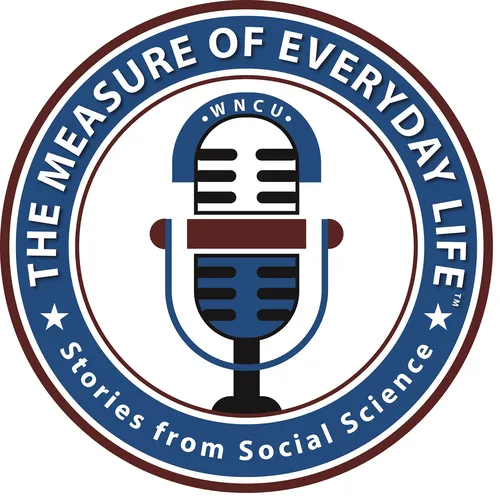
The Measure of Everyday Life
Interested in human behavior and how people think? The Measure of Everyday Life explores ideas about how we live and why people act as they do. Independent Weekly has called the show "unexpected" and "diverse" and says the show "brings big questions to radio." Join host Dr. Brian Southwell (@BrianSouthwell) as he explores the human condition.
Episodes air each Sunday night at 6:30 PM in the Raleigh-Durham broadcast market and a podcast of each show is available online the Wednesday following. The show is made possible by RTI International.
- Update frequency
- every 10 days
- Average duration
- 29 minutes
- Episodes
- 103
- Years Active
- 2021 - 2025

Collaborative Care to Help Trauma Survivors
When we hear stories about injuries from violence at the hands of other people or in the face of disasters, we often hear about acute physical injuries but there is more to the story in terms of ment…

Social Media, Posting Behavior, and Mental Health
Although it is easy to scroll through social media applications to see posts from all over the world, it can be challenging to know what is real and what is artificial and to know about the mindset a…

Learning How Developing Minds Shape Language
How exactly does language evolve and how do people shape it? On this episode, we talk with Molly Flaherty of Davidson College. She has studied the birth and evolution of a new language: Nicaraguan Si…

All We Need is Love?
Why do our news headlines often focus on war and crime and mortgage rates? Do we spend too much time focused on transactional markets and not enough on our unconditional existence as part of humanity…

Genetic Screening to Save Lives
We have seen recent innovations in our efforts to detect medical conditions in infants through genetic screening, including a program called Early Check based in North Carolina. The service now provi…

How People Judge the Identities of Others
Each of us has a sense of our own identity. Sometimes, though, people make judgements about what another person’s racial or ethnic identity is. How do people make those appraisals? On this episode, w…

Life after Adoption from Foster Care
What happens to children who have been adopted from foster care as they become adults? On this episode, we talk with Rose Domanico and Heather Ringeisen of RTI International and Nancy Rolock of Case …

Talking about Protection from Violence
Although the threat of gun violence is common for some Americans, how exactly court officials, law enforcement professionals, and survivors each tend to talk about weapons is not something we often r…

Data After Death
What happens to a person’s online data after they die is something we may not spend much time thinking about, and yet there is much potential for that data to echo into the future. On this episode, w…

Power Plants and Child Wellbeing
Generating electrical power is vital for our current way of life and yet the process can have direct effects on human health. On this episode, we talk with Sarah Komisarow of Duke University and Emil…

Healing Mental Suffering Across History
How can we improve our mental wellbeing by supporting our caregivers and healers? Dr. Kay Redfield Jamison of Johns Hopkins University School of Medicine has many ideas which have come to her in part…

Friendship and Our Health in Later Life
Most people generally understand what friendship is and yet the roles it plays in our wellbeing have yet to be fully explored. On this episode, we talk with psychology researcher William Chopik of Mi…

Teacher Work Experiences During the Pandemic
The COVID-19 pandemic has posed challenges for many different people, but one of those groups whose story hasn’t been sufficiently told yet is teachers. On this episode, we talk with Erin Thomsen and…

How to Engage Communities in Crisis
Communities sometimes emerge into the public spotlight at moments of crisis, such as when there is a dangerous train derailment or catastrophic damage to a water system. When we try to help those com…

Coping with Workplace Conflict
If you are hoping for a vacation this summer, it might reflect your frustrations with co-workers. Conflict in the workplace can be an important source of stress and can undermine team functioning. On…

Online Lurking and Society
Many of us sometimes scroll through the comments posted in reaction to a news article or social media post. How important is that and why might it matter? On this episode, we talk with Gina Sipley of…

What the Deaths of Unknown People Can Tell Us
When some people die, no one comes to claim them. The death of people without easily identified social network ties can signal a different sort of loss, a loss for a society which comprises alienatio…

Narcissism and News Personalization
What people now see presented on online platforms often reflects personal information about them, a situation which has raised alarms for some commentators. Might your personality affect whether you …

Uplifts Help Offset Traumatic Loss
Traumatic loss, such as the death of a person close to you, can affect your everyday wellbeing in many ways. On this episode, we talk with researchers who have explored ways people can cope with such…

Media Technology and Our Children
Parents often talk with family and friends about the roles of media in their children's lives, for better or worse. What can academic research tell us about what is ok for our kids? On this episode, …